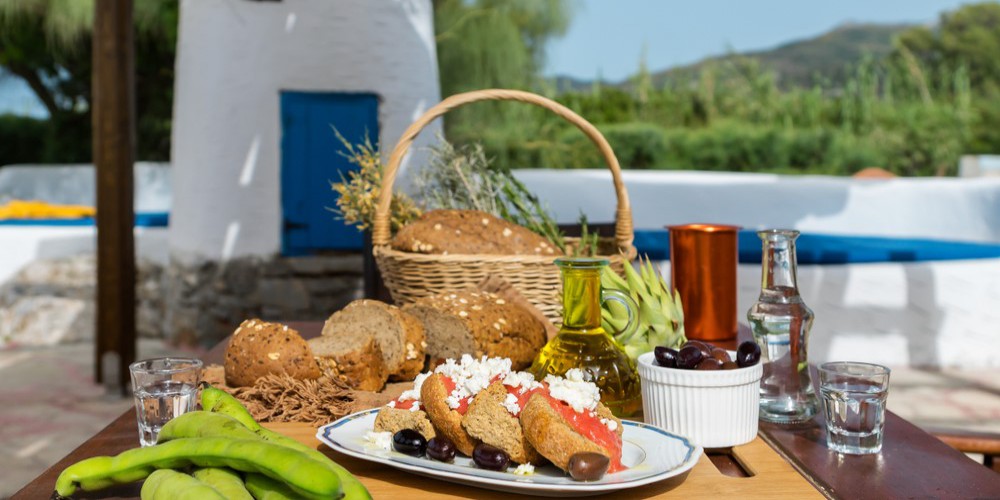
Wine Routes in Greece: Exploring Landscapes and Traditions
Key Takeaways
- Wine routes in Greece offer a unique blend of cultural and sensory experiences.
- Each wine region in Greece has its own charm and specialty wines.
- The wine routes highlight Greece's deep-rooted viticulture traditions.
- Exploring these routes provides insights into the cultural and economic significance of Greek wine.
 Wine in Greece - credits: DeepMeaning/Shutterstock.com
Wine in Greece - credits: DeepMeaning/Shutterstock.com
Greece, known for its rich history and beautiful landscapes, also offers wine lovers a unique adventure: exploring its distinct wine routes.
These routes not only showcase the beauty of Greece but also reveal its deep-rooted viticulture traditions.
Visitors can journey through regions like the Peloponnese, the cradle of many notable Greek wines.
Stops at wineries offer a taste of local flavors and a glimpse into the wine-making processes.
For those planning a trip, Greek wine routes promise more than just tastings. They offer an engaging look at the cultural and economic significance of wine in Greece.
History Of Wine Routes In Greece
 Pouring wine during sunset - credits: Alfira/Shutterstock.com
Pouring wine during sunset - credits: Alfira/Shutterstock.com
Wine routes in Greece have a rich history that reflects the importance of winemaking since antiquity.
The journey began with the cultivation of grapes, followed by the formation of organized routes in the late 20th century.
Over time, these routes have evolved, showcasing Greece's wine heritage and its significance to tourism and local economies.
Early History And Development
The story of wine routes in Greece starts with ancient winemaking traditions.
Evidence of grape cultivation dates back to prehistoric times, with wild grape residues found in various regions.
The Greeks mastered the art of winemaking and exported their wines throughout the Mediterranean.
They valued wine as part of daily life and religious rituals.
This strong historical foundation laid the groundwork for future developments in organized wine tourism.
The legacy continues to influence modern wine routes, highlighting the deep-rooted connection between culture and viticulture in Greece.
Establishment Of Organized Wine Roads
In 1993, Greece took a significant step by outlining its first organized wine roads.
This effort was led by the Wine Producers Association of the Northern Greece Vineyard (ENOAM).
These paved paths allowed visitors to explore regions rich in wine history, offering a structured way to experience the full range of Greek wines.
These routes aimed to promote regional wines and boost local economies.
They highlighted important wine-producing areas like Macedonia and Epiros, providing insights into the unique flavors associated with the diverse Greek terrain.
This initiative brought new life to the wine industry.
Evolution And Growth Over The Years
Since the establishment of organized routes, the wine tourism sector in Greece has grown significantly.
More regions have embraced wine roads, creating a network across the country.
The roads connect various wineries, inviting tourists to experience Greek wines through tastings and vineyard tours.
These developments have enhanced cultural tourism and increased global recognition of Greek wines.
The growth of wine routes showcases the dedication to preserving and celebrating Greece’s rich viticulture heritage.
This evolution reflects the ongoing passion for winemaking and its role in shaping Greece's identity.
Major Wine Routes In Greece
 Wine in Santorini - credits: - credits: Shutterstock.com
Wine in Santorini - credits: - credits: Shutterstock.com
Greece is known for its diverse wine regions, each offering unique experiences.
The major wine routes include the regions of Northern Greece, the Peloponnese, Santorini, and Crete.
These areas provide rich histories, stunning landscapes, and exceptional wines.
Wine Routes Of Northern Greece
The Wine Routes of Northern Greece showcase a mix of traditional and modern winemaking styles.
In this region, vineyards stretch across Macedonia, Epirus, and Thrace, offering a variety of grape varieties.
Notably, Xinomavro is a standout grape, producing robust and aromatic red wines.
Visitors can enjoy breathtaking scenery while exploring wineries that highlight the cultural influences of this area.
The region also hosts wine museums and events, making it a destination for wine enthusiasts who want to immerse themselves in the vibrant wine culture.
Peloponnese Wine Routes
The Peloponnese boasts an extensive network of wine routes. Key areas include Corinthia, Achaia, and Nemea.
Nemea is particularly famous for its Agiorgitiko grape, which produces full-bodied red wines.
The scenic routes here pass through lush olive groves and ancient sites.
Many wineries in the Peloponnese offer tours and tastings, providing insights into local winemaking traditions.
The region's diverse terrain contributes to a wide range of wine styles, making it a must-visit for travelers interested in both history and viticulture.
 Greek vineyard at sunset - credits: Capricorn Studio/Shutterstock.com
Greek vineyard at sunset - credits: Capricorn Studio/Shutterstock.com
Santorini Wine Routes
Santorini is renowned for its unique volcanic terroir.
The island's volcanic soil and climate create ideal conditions for growing the Assyrtiko grape, known for its crisp and mineral-rich white wines.
Visitors can explore the island's distinctive basket-trained vineyards, a method developed to protect the vines from strong winds.
Santorini's wineries often provide guided tours, where guests can taste vibrant wines while enjoying stunning sunsets and ocean views. This combination of wine and landscape offers an unforgettable experience.
Crete Wine Routes
Crete offers diverse wine routes, reflecting its long history of winemaking.
The island is divided into several wine-growing regions, with Heraklion, Chania, and Rethymno being the most prominent.
Liatiko and Vidiano are popular Cretan grape varieties, producing wines ranging from light to robust.
Crete's wine tours highlight both large vineyards and small family-owned wineries.
Visitors can enjoy tasting sessions accompanied by Cretan cuisine, enhancing the overall experience with local flavors.
Wine Tourism Experience
 Wine tasting experience - credits: karelnoppe/Shutterstock.com
Wine tasting experience - credits: karelnoppe/Shutterstock.com
Exploring the wine routes in Greece offers a blend of cultural enrichment and sensory delight.
Visitors can enjoy scenic landscapes, sip fine wines, and taste regional dishes. Here's a deep dive into what these tours offer.
What To Expect On A Wine Route Tour
A wine route tour in Greece typically leads travelers through stunning landscapes dotted with vineyards.
Tourists have the chance to explore the process of winemaking from grape to glass, gaining insights into Greece’s winemaking traditions.
Tours often include visits to enchanting villages and historical landmarks.
Whether walking through sunlit vineyards or visiting ancient cellars, each stop aims to educate and please the senses.
Many wineries open their doors, inviting wine lovers to taste their unique offerings.
It is an experience that blends learning with leisure, providing a memorable backdrop of scenic vineyards.
Expect a warm welcome as local producers are often eager to share the stories behind their local products and wines.
Guides are knowledgeable, offering rich tales of history and tradition.
Types Of Tours Available
There are various types of wine tours available to suit different preferences.
Group tours are popular for those seeking a social experience, offering a planned route, restaurants and scheduled tastings.
Private tours, on the other hand, offer a more personalized experience, focusing on specific interests or regions.
They tend to be more flexible and can be tailored to the group's desires.
For the more adventurous, self-guided tours offer freedom and can be done at one's own pace, allowing visitors to explore on their terms.
Some tours even include thematic programs, focusing on aspects like organic wineries or specific grape varieties.
These options ensure that every wine enthusiast finds a tour fitting their interests.
Wine Tasting Experiences
Wine tastings in Greece are a celebration of the country's diverse viticultural regions and flavours.
Participants can expect to sample a range of wines, including whites, reds, and rosés, each with distinct flavors and aromas.
The experience is often guided by a sommelier or winemaker who educates guests on the characteristics of each wine.
Wineries often include a selection of native grape varieties, offering wines that capture the essence of the local terroir.
Tasting sessions are often paired with small bites of local delicacies, enhancing the experience.
An emphasis on local varieties gives visitors a true sense of place, connecting them with the region's identity through taste and aroma.
Local Cuisine And Food Pairings
Food plays a significant role in the wine tourism experience in Greece.
Many wine tours include culinary experiences featuring both local wines and dishes that highlight regional flavors.
Cheese, olives, and freshly baked bread are commonly served alongside the wines to enhance the tasting experience.
Meze platters with items like tzatziki, dolmades, and grilled meats often accompany tastings, offering a taste of authentic Greek cuisine.
Some tours feature full meals at wineries, encouraging guests to savor traditional dishes crafted from local ingredients.
This emphasis on food pairings provides an enjoyable exploration of Greece’s gastronomic heritage, with each bite complementing the wines offered.
Notable Greek Wines And Varieties
 Wine tasting outdoors - credits: eyeris.work/Shutterstock.com
Wine tasting outdoors - credits: eyeris.work/Shutterstock.com
Greek wines offer a rich tapestry of flavors from diverse grape varieties cultivated in distinct regions.
Among these are unique wines with intriguing histories and characteristics linked to the natural environment.
Overview Of Indigenous Grape Varieties
Greece is home to a variety of indigenous grapes that highlight the nation's winemaking heritage.
Assyrtiko, primarily grown in Santorini, thrives in volcanic soils and is known for its crisp acidity.
Xinomavro, found in northern wine regions like Naoussa, offers a tannic structure suitable for aging.
Agiorgitiko is celebrated in the Nemea area, featuring a deep color and robust taste.
Mavrodaphne, often used for sweet wines, presents a rich profile that stands out in blends.
These grapes provide the foundation for Greece's most notable wines.
Popular Greek Wines
Greek wines boast unique expressions based on geography and technique.
Retsina, a distinctive wine, is flavored with pine resin, traditionally produced in Attica.
The Santorini Assyrtiko delivers mineral notes due to the island's volcanic terroir, gaining global acclaim for its elegance.
In the Peloponnese, Agiorgitiko from Nemea showcases a full-bodied red, often compared to Cabernet Sauvignon. Meanwhile, Naoussa Xinomavro offers complex layers of dried fruit and spice.
These wines represent the rich diversity and heritage of Greek winemaking.
Unique Characteristics Of Greek Wines
Greek wines are not only distinguished by their grape varieties but also their winemaking processes.
The volcanic soils of Santorini impart Assyrtiko wines with a mineral-driven profile, marking them as sophisticated and dynamic.
Retsina is known for its resinous character, a result of traditional aging methods in pine barrels.
The use of ancient techniques and the Mediterranean climate contribute to the distinct flavors found in Greek wines.
These elements ensure that wines from Greece possess a distinctive charm appreciated by wine lovers worldwide.
Planning Your Wine Route Tour In Greece
 Toasting with wine - credits: loreanto/Shutterstock.com
Toasting with wine - credits: loreanto/Shutterstock.com
Exploring Greece's wine routes offers an unforgettable journey through stunning landscapes and historic vineyards.
Best Times To Visit
Visiting Greece for a wine tour is best during the spring (April to June) or autumn (September to October).
During these months, the weather is pleasant and vineyards are alive with activity. The grape harvest in late summer is particularly vibrant.
Spring brings blooming landscapes and fewer tourists, offering a more relaxed experience.
In autumn, visitors can witness the grape harvest, making it a great time to engage with local winemakers.
It's also important to consider that many wineries have specific days and times for tours, so planning ahead is crucial.
Tips For Travelers
- When embarking on a wine route in Greece, it's beneficial to book in advance, especially during peak tourist seasons. Some wineries require reservations for tastings and tours.
- Hiring a private tour can be advantageous for convenience and a personalized experience.
- An air-conditioned vehicle is recommended, particularly during the warmer summer months.
- Researching tour reviews on platforms like TripAdvisor can provide insights from other travelers.
- Bring a camera to capture the beautiful vineyard scenery and local culture.
- Wearing comfortable shoes is advisable as vineyard tours often involve walking.
- Keeping lightweight clothing handy is also beneficial, given Greece's warm climate.
Final Thoughts
 Drinking wine with a view of the Acropolis - credits:kanuman/Depositphotos.com
Drinking wine with a view of the Acropolis - credits:kanuman/Depositphotos.com
Wine routes in Greece offer a unique blend of history, culture, and flavor. These routes take visitors through beautiful landscapes, showcasing the diversity of Greek wine regions.
Many regions, such as Northern Greece and Crete, have developed vibrant wine tourism markets. They provide opportunities to explore multiple wineries and enjoy local hospitality.
Wine routes in Greece continue to grow, attracting enthusiasts from around the world. They serve as a gateway to understanding the rich heritage of Greek winemaking.













